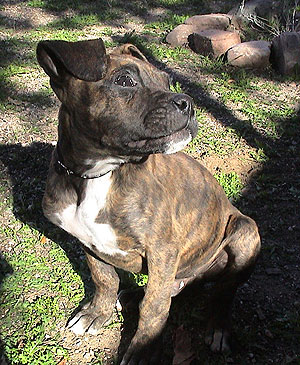Bodhi's Background

Bodhi is a canine boxer and was born June 29, 2004. He arrived at his home in Albuquerque, New Mexico on October 30, 2004 through Boxer Rescue of Albuquerque. The picture at the right is one day after he arrived at his new home. I was initially supposed to foster care for him for one night, or so I was told, until he was taken to a long term foster family. After spending that first day with him, I knew how much this sweet little dog needed an extra special home. He has stayed with me ever since.
At that time, his only known health issue was congenital blindness. Being born blind has not stopped him from acting like any other dog. He tries getting into any and every thing! He used to love to follow his older adopted sister, Elley, around. Within just a few weeks, he learned the layout of the house and the backyard. The doggy door took a little longer. After a couple of months, he was able to go in and out all by himself. He needs lots of touching and verbal communication to feel safe and know where I am. When he wants attention or is lost, he howls quite loudly. Overall he is a very happy dog who just needs extra special attention and patience. Seeing him happy makes the extra effort very worthwhile.
After many months of increasing aggression with food and other territorial issues, behavioral modification was attempted. Immediately upon seeing Bodhi's behavior, a trainer I had hired to come to the house suggested neurological testing. His thyroid was tested and ultimately ruled out as the cause for aggression. Due to the continued aggression and other unsual behavioral traits, an MRI was recommended by Bodhi's regular veterinarian. I drove him to Veterinary Specialty and Emergency Hospital in Englewood, Colorado for an MRI. Bodhi was diagnosed with congenital hydrocephalus on December 1, 2005 by Dr. Stephen Lane. His current treatment includes medication to try to control his seizures. Bodhi's long term prognosis at the time of diagnosis was a long happy life.
Bodhi's hydrocephalus is a result of obstruction to the of outflow of cerebrospinal fluid from the ventricles. This has caused a "back up" of cerebrospinal fluid in his brain, causing a bubble. Around this enlarged area, his brain tissue has deteriorated leaving mostly the lower brain functions remaining. His case is not as severe as some other dogs. His head does not appear to be abnormally enlarged due to his condition. He does favor his right side - running in clockwise circles is a regular occurrence. He still takes much longer than a "normal" dog to learn, but he still has some learning capabilities. Unfortunately I have been unsuccessful in teaching him any word associations, except for "No" which is most likely just tone of voice recognition. Since his survival instincts are heightened, I have tried using the same word when feeding him, but after many months, he still does not repsond to the verbal association. He only respondes to the tapping on the side of his metal bowl.
If you suspect your dog has congenital hydrocephalus, the path I chose seems to be the only one - an MRI. While shunts are a treatment option sometimes, Bodhi's condition was too far progressed and would have needed repeating as he grew since he was still a puppy when diagnosed. Don't always take the first advice you receive, especially if it concerns euthanizing - you cannot undo that choice. If you cannot take care of a special needs animal, check with local rescue organizations. While proper diagnoses was costly, Bodhi's quality of life has been greatly enhanced due to proper medication after his diagnosis. The money and effort on diagnosing Bodhi's condition seems irrelevant now when I see how happy he is. The main advice I could provide is to find a board certified neurologist. Your local veterinarian should be able to let you know of the closest neurologist in your general area.
Copyright 2005-2024